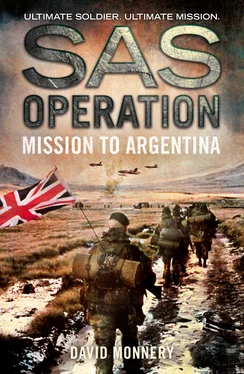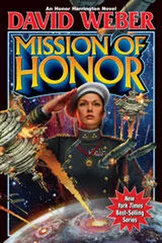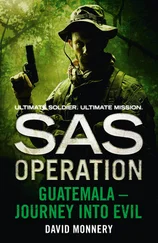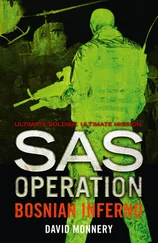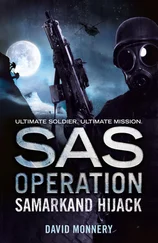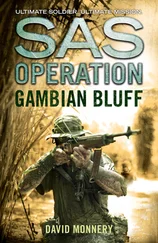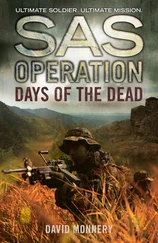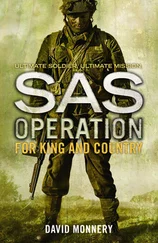‘Thank you, Air Marshal,’ the PM said coolly. On her left, Weighell noticed, Matheson was having a hard job concealing his relief. But the Foreign Office man had been conned, Weighell decided: the PM could not have been expecting anything else from Railton. Where was all this leading?
‘One question,’ the Latin American Desk man said. ‘Since the Super Etendards and Exocets pose the main threat, could we not just move our agent in Rio Gallegos to Rio Grande and set up some sort of communication link between her and the fleet?’
It was an intelligent question, Weighell thought.
‘It might be possible,’ Sharp agreed, ‘but it would certainly place the agent at risk. She has a good cover where she is, and promises to provide invaluable intelligence on the airlift. Agents are always more vulnerable when moved, and there would be the extra risk involved in getting the radio to her.’
Weighell suddenly knew where it was all leading, and why he was there.
As if on cue, the PM turned her beady gaze in his direction. ‘Lieutenant-Colonel Weighell, how would the SAS like to have a crack at these airfields?’
Weighell noticed Matheson’s eyes roll in horror, and resisted the temptation to let her steamroller right over him. ‘If it’s a feasible option,’ he said, ‘then of course we’d like nothing better.’
‘Does it look like one?’ she persisted.
Weighell imagined he was being given a major insight into how cabinet government worked in the modern age. ‘I’m sorry, Prime Minister,’ he forced himself to say, ‘but I’d need a lot more data than I have now, not to mention a clearer idea of the task required. Are we talking about observation or military action here?’
‘Either or both,’ she said decisively.
‘Prime Minister…’ Matheson interjected.
‘Hold on a moment, Cecil,’ she said, patting him on the arm in as patronizing a manner as Weighell could remember witnessing, ‘let’s find out what we’re capable of before you start explaining why we shouldn’t risk it.’ She turned a smile on Weighell.
You could rob a bank with a smile like that, Weighell thought. ‘We’re talking about two totally different missions,’ he said. ‘An attack on either airfield would require up to a squadron of men – around sixty that is – inserted from the air at night. Probably a high-altitude low-opening parachute drop. From a C-130.’ He paused, gathering his thoughts. ‘That in itself would not present any great problems, unless of course they were dropped into the middle of an Argentinian military base we knew nothing about. But there are always unknown hazards – the mechanics of insertion are simple enough.’ As the bishop said to the actress, he thought to himself.
‘The obvious problem,’ he continued, ‘would come with the extraction. Particularly if we’re planning to hit two bases simultaneously. I don’t see any way of getting two squadrons out, by air or sea. You’d need either every submarine in the fleet or, at that sort of range, every helicopter. And I presume the thought of 120 SAS men crashing across the border into Chile is hardly desirable, even assuming they could get to it…’
‘God forbid,’ Matheson muttered.
‘What if the C-130 drops the troops and they secure the airfields?’ the PM asked. ‘Surely then the planes could land and take the troops off?’
‘It’s theoretically possible,’ replied Weighell. He had to admit a part of him was thrilled by the idea. The rest of him urged caution, however. ‘For such an operation to be anything more than a suicide mission,’ he went on, ‘we’d have to know a hell of a lot more about the airbases in question.’
‘Prime Minister,’ Matheson interjected again, and this time she let him have his say. ‘Such action…’ he began, before pausing, apparently lost for words.
‘Such action would have Washington in uproar,’ she said. ‘I know. Obviously we have no desire to upset the United States. Nor would it serve us well to do so, at least in the long run. But we have to balance such concerns against the well-being of the Task Force. Whether we like it or not, Britain’s standing in the world is in their hands, gentlemen. I am not prepared to risk defeat merely for the sake of not offending a few American politicians. So please, Lieutenant-Colonel, I would like some contingency planning done. Just in case.’
‘Very well, Ma’am.’
‘Now, for the second possibility you mentioned – observation.’ The basilisk stare transfixed him one more.
Here at least, Weighell felt on much safer ground. What the four-man patrols were already doing on East and West Falkland could just as easily be done on the mainland. Or almost. ‘We could put two four-man teams down close to the two airbases,’ he said, ‘probably by Sea King helicopter, though I’d have to check the range-to-weight ratios. I would guess it would have to be a one-way trip. The terrain hardly lends itself to staying unseen, but that’s just as true of the Falklands, and we already have patrols ashore on both islands.’
‘If the trip in was one-way,’ Matheson observed, ‘you still have the problem of how to get the men out again.’
‘True,’ Weighell conceded. ‘But eight men is a very different proposition to 120. One or two submarines could probably take them off. At worst, as few men as that could seek asylum in Chile without causing a major row.’
‘My objections remain the same,’ Matheson said. ‘Of course I agree with you, Prime Minister, that we may have to take diplomatic risks for the sake of a military victory. Or at least to avoid a military humiliation. But I cannot see that the military situation at present is such as to justify this sort of operation.’
‘Brigadier?’ the PM asked Harringham.
‘I cannot comment on the diplomatic issue, Prime Minister. Any improvement in the fleet’s AEW capability would obviously be beneficial, but I am yet to be convinced that the enemy air force poses much more than a theoretical threat to the Task Force.’
‘Dennis?’ she asked.
‘I would have to agree with the Brigadier,’ Eckersley said. It was the first time Weighell could remember him speaking.
‘Very well,’ the PM said. ‘I cannot say I feel entirely happy about it, but for the moment we shall shelve the idea of mounting mainland operations.’ She paused. ‘However,’ she continued, turning to Weighell, ‘I want detailed contingency plans prepared for those operations we have discussed. And I expect’ – this time Harringham was her target – ‘the SAS to receive the full cooperation of the fleet in this matter. If and when something happens to tip the balance – if the threat to the Task Force does become more than theoretical – then I shall expect both a different consensus of opinion and the possibility of immediate action.’ She surveyed those around the table – making sure she remembered who had been present, Weighell decided – flashed one wide smile at them all, rose from her chair and swept out through the door.
Around the table there were several heartfelt sighs of relief. Weighell found himself wondering whether sending the Junta a video of the meeting might not encourage an early surrender.
That same Sunday Isabel Fuentes drove out of Rio Gallegos in the black Renault 5 and headed south across the almost undulating steppe towards the Chilean border some 40 miles away. There was almost no traffic on the road: in the first 10 miles she encountered two trucks, one bus and about a dozen cars.
It was one of those late autumn days she remembered from childhood, clear but cold enough to make you think of the winter to come. On the seat beside her she had a vacuum flask full of coffee and a couple of spicy empanadas wrapped in a paper bag. Under the seat, sealed in a plastic bag, were the facts she had so far managed to accumulate concerning the military situation at the Rio Gallegos airbase. There were not many of them, but she had had only two meetings with her sad-eyed pilot, and all he had wanted to talk about was the girlfriend he had left behind in the north.
Читать дальше
